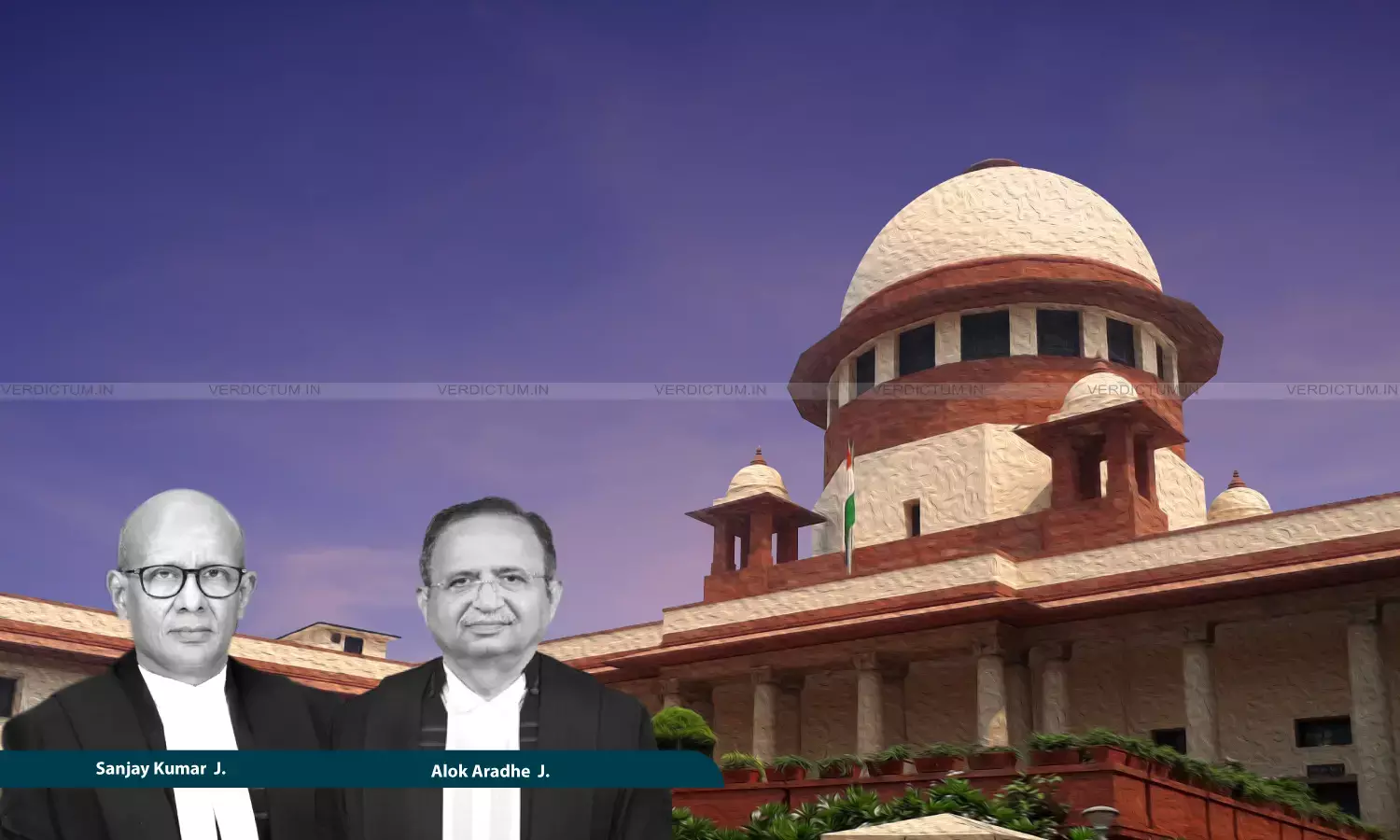Misinterpretation Of Tender Conditions Reducing Competition And Revenue Justifies Court Intervention: Supreme Court
The Apex Court held that when a tendering authority misconstrues a tender condition in a manner that excludes the highest bidder and results in loss to the public exchequer, judicial interference becomes necessary as public tenders are not private bargains but instruments of public trust.

Justice Sanjay Kumar, Justice Alok Aradhe, Supreme Court
The Supreme Court has held that courts are duty-bound to intervene where a tender condition is misinterpreted in a manner that narrows competition and deprives the State of legitimate revenue.
The Court stated that public auctions are an exercise of public trust, and any interpretation that diminishes public value cannot be sustained.
The Apex Court was hearing civil appeals arising out of a tender dispute concerning the grant of a five-year sand quarry lease in Odisha, wherein the bid of the highest bidder was rejected on the ground of alleged non-compliance with Rule 27(4)(iv) of the Odisha Minor Mineral Concession Rules, 2016.
A Bench comprising Justice Sanjay Kumar and Justice Alok Aradhe, while adjudicating the matter, observed that “…when an authority acting under a tender misinterprets the tender condition that diminishes competition and deprives the State of its legitimate revenue, the constitutional duty of the court to interfere is beyond question.”
Senior Advocate Ashok Panigrahi represented the petitioner, while Advocate Shibashish Misra, AOR, appeared on behalf of the respondents.
Background
The matter arose from a notice inviting bids for the extraction of sand from a quarry in Cuttack for five years. Clause 5 of the tender incorporated Rule 27(4)(iv) and required bidders either to submit an Income Tax Return of the “previous financial year,” or furnish an 18-month bank guarantee equivalent to the royalty plus additional charges.
Twenty bidders participated. The highest bidder quoted ₹2127.27 per cubic metre, whereas the successful bidder quoted ₹1250 per cubic metre. The highest bidder was rejected because it had not filed an Income Tax Return for the financial year 2021-2022, and therefore did not fulfil tender conditions.
The High Court upheld the rejection but directed the successful bidder to match the higher rate, citing concerns about loss to the State. Both parties appealed in the Supreme Court.
Court’s Observation
The Supreme Court, upon hearing the matter, held that while judicial review in tender matters is limited, it is available where the decision-making process is arbitrary, irrational or contrary to public interest. Referring to earlier precedents including TATA Cellular, Michigan Rubber and Banshidhar Construction, the Court reiterated that public tenders must ensure transparency and maximise public value.
The Bench emphasised that “a public tender is not a private bargain, but an instrument of governance, a mechanism through which the State discharges its solemn duty as trustee of public wealth”. Its purpose, the Court held, “is not merely procedural compliance, but maximisation of public value through a process i.e. fair, transparent and competitive.”
The central issue was whether the highest bidder was required to file the Income Tax Return for the financial year 2021-2022 when bids were submitted on 18.07.2022. Under the Income Tax Act, a company could file a return for FY 2021-2022 up to 31 October 2022, meaning the return was not yet due.
The Bench held that the term “previous financial year” must be construed in harmony with the Income Tax Act. Thus, the correct previous year, the Court noted, was 2020-2021, which the appellant had already filed.
The Court held that the Tender Committee’s interpretation was “narrow and erroneous,” and resulted in exclusion of the highest bidder on an untenable basis, stating: “When an interpretation of a tender condition narrows competition and excludes the highest bidder on a ground unsupported by law, the decision-making process is vitiated. The interpretation of the terms of tender must, therefore, serve the object and purpose of the tender, mainly to maximise the revenue to the State, when it deals with a natural resource.”
Such an interpretation by the Tender Committee, the Bench held, “undermines the principle that State must act to enhance and not diminish, the public exchequer in case it is dealing with natural resources.”
The Court reiterated that the State acts as trustee of public resources and must ensure maximum value. Sand, being a natural resource, must be allotted in a manner that protects public revenue.
The Bench also noted that a substantial part of the lease period (over three years) had already elapsed due to litigation. Since the successful bidder had expressed willingness to match the highest rate, the Court considered that the appropriate remedy was to direct a fresh tender rather than enforce the previous one.
Conclusion
The Supreme Court set aside the Orissa High Court’s judgment and quashed the tender process.
The Court directed the Tehsildar to issue a fresh auction notice for the lease, permitting all bidders to participate. The successful bidder was held to be entitled to a refund of the deposited amount along with 6% interest, since the lease deed was not executed due to litigation.
The appeals were disposed of accordingly.
Cause Title: M/S Shanti Construction Pvt. Ltd. v. The State of Odisha & Ors (Neutral Citation: 2025 INSC 1295)
Appearances
Appellant: Senior Advocate Ashok Panigrahi, with Advocates Geetanjali Das Krishnan, Dhuli Venkata Krishna, Aryan Singh, Surajit Bhaduri, and others.
Respondents: Advocates Shibashish Misra, AOR, Dhananjaya Mishra, AOR, Amritesh Mohanty, Navneet Dogra and others


